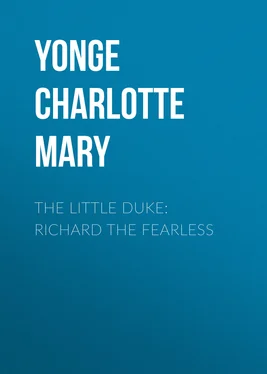Charlotte Yonge - The Little Duke - Richard the Fearless
Здесь есть возможность читать онлайн «Charlotte Yonge - The Little Duke - Richard the Fearless» — ознакомительный отрывок электронной книги совершенно бесплатно, а после прочтения отрывка купить полную версию. В некоторых случаях можно слушать аудио, скачать через торрент в формате fb2 и присутствует краткое содержание. Жанр: foreign_children, literature_19, foreign_antique, foreign_prose, на английском языке. Описание произведения, (предисловие) а так же отзывы посетителей доступны на портале библиотеки ЛибКат.
- Название:The Little Duke: Richard the Fearless
- Автор:
- Жанр:
- Год:неизвестен
- ISBN:нет данных
- Рейтинг книги:5 / 5. Голосов: 1
-
Избранное:Добавить в избранное
- Отзывы:
-
Ваша оценка:
- 100
- 1
- 2
- 3
- 4
- 5
The Little Duke: Richard the Fearless: краткое содержание, описание и аннотация
Предлагаем к чтению аннотацию, описание, краткое содержание или предисловие (зависит от того, что написал сам автор книги «The Little Duke: Richard the Fearless»). Если вы не нашли необходимую информацию о книге — напишите в комментариях, мы постараемся отыскать её.
The Little Duke: Richard the Fearless — читать онлайн ознакомительный отрывок
Ниже представлен текст книги, разбитый по страницам. Система сохранения места последней прочитанной страницы, позволяет с удобством читать онлайн бесплатно книгу «The Little Duke: Richard the Fearless», без необходимости каждый раз заново искать на чём Вы остановились. Поставьте закладку, и сможете в любой момент перейти на страницу, на которой закончили чтение.
Интервал:
Закладка:
Richard wept too bitterly to speak, and Bernard de Harcourt, taking his hand, led him away from the Church.
CHAPTER III
Duke William of the Long Sword was buried the next morning in high pomp and state, with many a prayer and psalm chanted over his grave.
When this was over, little Richard, who had all the time stood or knelt nearest the corpse, in one dull heavy dream of wonder and sorrow, was led back to the palace, and there his long, heavy, black garments were taken off, and he was dressed in his short scarlet tunic, his hair was carefully arranged, and then he came down again into the hall, where there was a great assembly of Barons, some in armour, some in long furred gowns, who had all been attending his father’s burial. Richard, as he was desired by Sir Eric de Centeville, took off his cap, and bowed low in reply to the reverences with which they all greeted his entrance, and he then slowly crossed the hall, and descended the steps from the door, while they formed into a procession behind him, according to their ranks—the Duke of Brittany first, and then all the rest, down to the poorest knight who held his manor immediately from the Duke of Normandy.
Thus, they proceeded, in slow and solemn order, till they came to the church of our Lady. The clergy were there already, ranged in ranks on each side of the Choir; and the Bishops, in their mitres and rich robes, each with his pastoral staff in his hand, were standing round the Altar. As the little Duke entered, there arose from all the voices in the Chancel the full, loud, clear chant of Te Deum Laudamus , echoing among the dark vaults of the roof. To that sound, Richard walked up the Choir, to a large, heavy, crossed-legged, carved chair, raised on two steps, just before the steps of the Altar began, and there he stood, Bernard de Harcourt and Eric de Centeville on each side of him, and all his other vassals in due order, in the Choir.
After the beautiful chant of the hymn was ended, the service for the Holy Communion began. When the time came for the offering, each noble gave gold or silver; and, lastly, Rainulf of Ferrières came up to the step of the Altar with a cushion, on which was placed a circlet of gold, the ducal coronet; and another Baron, following him closely, carried a long, heavy sword, with a cross handle. The Archbishop of Rouen received both coronet and sword, and laid them on the Altar. Then the service proceeded. At that time the rite of Confirmation was administered in infancy, and Richard, who had been confirmed by his godfather, the Archbishop of Rouen, immediately after his baptism, knelt in solemn awe to receive the other Holy Sacrament from his hands, as soon as all the clergy had communicated. 8 8 Sus le maistre autel del iglise Li unt sa feauté jurée.
When the administration was over, Richard was led forward to the step of the Altar by Count Bernard, and Sir Eric, and the Archbishop, laying one hand upon both his, as he held them clasped together, demanded of him, in the name of God, and of the people of Normandy, whether he would be their good and true ruler, guard them from their foes, maintain truth, punish iniquity, and protect the Church.
“I will!” answered Richard’s young, trembling voice, “So help me God!” and he knelt, and kissed the book of the Holy Gospels, which the Archbishop offered him.
It was a great and awful oath, and he dreaded to think that he had taken it. He still knelt, put both hands over his face, and whispered, “O God, my Father, help me to keep it.”
The Archbishop waited till he rose, and then, turning him with his face to the people, said, “Richard, by the grace of God, I invest thee with the ducal mantle of Normandy!”
Two of the Bishops then hung round his shoulders a crimson velvet mantle, furred with ermine, which, made as it was for a grown man, hung heavily on the poor child’s shoulders, and lay in heaps on the ground. The Archbishop then set the golden coronet on his long, flowing hair, where it hung so loosely on the little head, that Sir Eric was obliged to put his hand to it to hold it safe; and, lastly, the long, straight, two-handed sword was brought and placed in his hand, with another solemn bidding to use it ever in maintaining the right. It should have been girded to his side, but the great sword was so much taller than the little Duke, that, as it stood upright by him, he was obliged to raise his arm to put it round the handle.
He then had to return to his throne, which was not done without some difficulty, encumbered as he was, but Osmond held up the train of his mantle, Sir Eric kept the coronet on his head, and he himself held fast and lovingly the sword, though the Count of Harcourt offered to carry it for him. He was lifted up to his throne, and then came the paying him homage; Alan, Duke of Brittany, was the first to kneel before him, and with his hand between those of the Duke, he swore to be his man, to obey him, and pay him feudal service for his dukedom of Brittany. In return, Richard swore to be his good Lord, and to protect him from all his foes. Then followed Bernard the Dane, and many another, each repeating the same formulary, as their large rugged hands were clasped within those little soft fingers. Many a kind and loving eye was bent in compassion on the orphan child; many a strong voice faltered with earnestness as it pronounced the vow, and many a brave, stalwart heart heaved with grief for the murdered father, and tears flowed down the war-worn cheeks which had met the fiercest storms of the northern ocean, as they bent before the young fatherless boy, whom they loved for the sake of his conquering grandfather, and his brave and pious father. Few Normans were there whose hearts did not glow at the touch of those small hands, with a love almost of a parent, for their young Duke.
The ceremony of receiving homage lasted long and Richard, though interested and touched at first, grew very weary; the crown and mantle were so heavy, the faces succeeded each other like figures in an endless dream, and the constant repetition of the same words was very tedious. He grew sleepy, he longed to jump up, to lean to the right or left, or to speak something besides that regular form. He gave one great yawn, but it brought him such a frown from the stern face of Bernard, as quite to wake him for a few minutes, and make him sit upright, and receive the next vassal with as much attention as he had shown the first, but he looked imploringly at Sir Eric, as if to ask if it ever would be over. At last, far down among the Barons, came one at whose sight Richard revived a little. It was a boy only a few years older than himself, perhaps about ten, with a pleasant brown face, black hair, and quick black eyes which glanced, with a look between friendliness and respect, up into the little Duke’s gazing face. Richard listened eagerly for his name, and was refreshed at the sound of the boyish voice which pronounced, “I, Alberic de Montémar, am thy liegeman and vassal for my castle and barony of Montémar sur Epte.”
When Alberic moved away, Richard followed him with his eye as far as he could to his place in the Cathedral, and was taken by surprise when he found the next Baron kneeling before him.
The ceremony of homage came to an end at last, and Richard would fain have run all the way to the palace to shake off his weariness, but he was obliged to head the procession again; and even when he reached the castle hall his toils were not over, for there was a great state banquet spread out, and he had to sit in the high chair where he remembered climbing on his father’s knee last Christmas-day, all the time that the Barons feasted round, and held grave converse. Richard’s best comfort all this time was in watching Osmond de Centeville and Alberic de Montémar, who, with the other youths who were not yet knighted, were waiting on those who sat at the table. At last he grew so very weary, that he fell fast asleep in the corner of his chair, and did not wake till he was startled by the rough voice of Bernard de Harcourt, calling him to rouse up, and bid the Duke of Brittany farewell.
Читать дальшеИнтервал:
Закладка:
Похожие книги на «The Little Duke: Richard the Fearless»
Представляем Вашему вниманию похожие книги на «The Little Duke: Richard the Fearless» списком для выбора. Мы отобрали схожую по названию и смыслу литературу в надежде предоставить читателям больше вариантов отыскать новые, интересные, ещё непрочитанные произведения.
Обсуждение, отзывы о книге «The Little Duke: Richard the Fearless» и просто собственные мнения читателей. Оставьте ваши комментарии, напишите, что Вы думаете о произведении, его смысле или главных героях. Укажите что конкретно понравилось, а что нет, и почему Вы так считаете.












